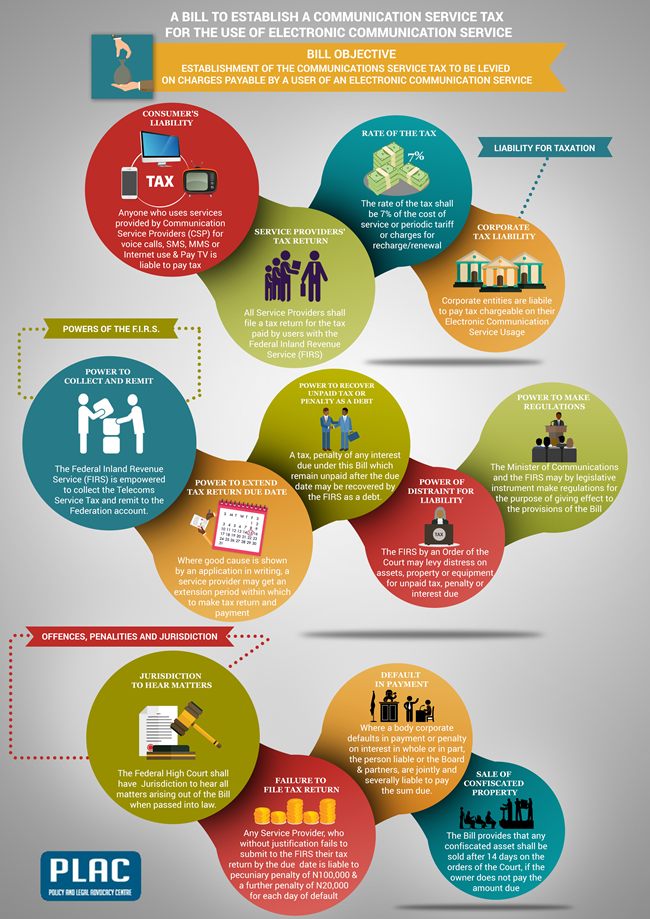HB 525: Telecommunication Services Tax Bill, 2016
Download Bill Bill Analysis Download Bill Analysis Infograph
Sponsor:
Hon. Saheed Akinade Fijabi
State:
OYOParty:
ALL PROGRESSIVES CONGRESSBill Status: Awaiting Committee Report
- First Reading: 04/05/2016
- Second Reading: 01/06/2016
- Committee Referred To: Committee on Telecommunications
- Consolidated with:Consolidated with HB 327
- Date Reported out of Committee:
- Third Reading:
- Reconsidered and Passed:
Bill Analysis:
SHORT TITLE
Telecommunication Services Tax Bill, 2016
OBJECTIVE OF THE BILL
The objective of the Bill is to establish a tax to be known as the Communication Service Tax, which shall be assessed, collected and administered in accordance with the provision of this Bill; to be levied on charges payable by a user of an electronic communication service, other than private electronic communication services.
NUMBER OF CLAUSES/PARTS
The Bill has 18 Clauses, including the regulations and short title
CONTENTS
The Bill has the following contents: -
- Establishment of the Communication Service Tax
- Imposition of the Communication Service Tax on Electronic Communication Service users;
- Liability to pay the Communication Service Tax and tax rate
- Collection and remittance of the tax into the Federation Account
- Submission of tax return
- Interest payment and outstanding taxation
- Recovery of tax, interest or due penalty
IMPLICATIONS OF THE BILL
1. Liability to Pay the Communication Service Tax (CST)
Anyone who uses services provided by Communication Service Providers (CSP) for voice calls, SMS, MMS, data usage from telephone or Internet use, and pay per view TV stations and related services, is liable to pay the CST. Clause 2(1) specifies that private Electronic Communication Services shall be exempted from the tax and Clause 2(3) provides that recharges shall be considered as charges for usage of Communication services.
In effect, the cost of tariffs, recharges, cable TV monthly subscription and other related periodic payments are bound to increase to include the CST. Communication Service users will now have to pay extra to purchase the same quality and size of data or service for their devices.
An Electronic Communication Service is private when the user is getting the service from a corporate body or entity with which it is affiliated, to satisfy its internal needs, for instance a staff member in an organization cannot pay tax for using the service provided by their organization for business.
2. Rate of the Tax: - The tax rate shall be 7% in accordance with Clause 4 of the Bill. This means that every user gets to pay the specified tariff for the service plus an additional 7% of the amount paid for the recharge or renewal, as tax.
3. Duty to Collect and Remit: - The Federal Inland Revenue Service (FIRS) is empowered by Claus 5(1) of the Bill to collect and remit the tax to the Federation Account. Given that Section 1 of the FIRS Act, 2007 makes the FIRS the responsible body to collect and remit tax to the Federation Account; the establishment Act would not require an amendment to include the collection of this tax.
4. Service Providers’ Tax Return: - Clause 6 provides that all service providers shall file a tax return for the tax paid by users. The payment and documentation required for this process shall be submitted to the FIRS not later than the last working day of the month immediately following the month to which the tax return and payment relates. This means that the tax remittance to the FIRS shall be monthly and the service provider must ensure that taxes due in a month are completely collected, and ready to be paid to the FIRS at the end of the following month.
5. Penalty for Failure to File Tax Return: Clause 6(8) of the Bill provides that a service provider who without justification fails to submit to the FIRS the tax return by the due date is liable to a pecuniary penalty of N100,000 and a further penalty of N20,000 for each day the return is not submitted. Therefore a service provider may not pay a penalty if it provides justification acceptable to the FIRS.
6. Extension of Tax Return Due Date – Where good cause is shown by an application in writing, the service provider may get an extension period within which to make the tax return and payment. However, Clause 7(1) stipulates that subject to this condition, a service provider who fails to pay the tax by the due date shall pay monthly interest on the tax due at a rate of 150% of the average of the prevailing commercial banks’ lending rate as published by the Central Bank of Nigeria (CBN).
Also where the interest payable is not paid within one month after the due date, interest shall be paid on the unpaid interest at the same rate and in the same manner on the unpaid tax.
7. Corporate Tax Liability: - Clause 8(3) provides that where a body corporate or incorporated is liable to pay tax, any defaults in payment or penalty on interest, in whole or in part after written demand, the directors, partners and the person in charge of the body are jointly and severally liable to pay the sum due.
Where tax, penalty or interest due remain unpaid, the FIRS may apply to the court by motion on notice to the person from whom the payment is due for an order to levy distress on goods, chattels, assets, property or land in use or held in trust for that person. If a person is authorized by the FIRS to execute the order of distress on goods and assets of a defaulter, the authorized person may break open any building or place in the daytime for that purpose. In effect, any nighttime raid on a person’s property will be illegal under this Bill (when passed into law).
8. Sale of a Confiscated Property: - Clause 9 (5) provides that any asset or property confiscated during a daytime authorized seizure shall be sold if after 14 days the owner does not pay the amount due and incidental to the distress are not paid, on the orders of the court.
Where the seized property in the execution of the distress warrant is under mortgage, bill of sale or charged by way of security for debt, the interest of the FIRS has precedence over all the interests. Furthermore, Clause 10 stipulates that where tax, penalty or interest is due under the Bill (when passed into law) from a person who is subject to liquidation, receivership or winding-up, the debtor shall not distribute the assets until full payment has been made of the Tax penalty or interest due under this Bill.
These Clauses clearly point to the fact that the debt owed to the FIRS takes precedence over any other debt and must be completely settled before any other process of debt settlement is initiated.
9. Court Jurisdiction: - The Federal High Court shall have the jurisdiction to hear all matters under the Bill (when passed into law).
10. Admissible Evidence: Under Clause 13(2), a photocopy of a document furnished to the FIRS under the requirement of this Bill (when passed into law) and certified by the FIRS is admissible in civil or criminal proceedings to the extent as the original. The Bill did not specify a Court Certified True Copy (CTC) as admissible, which means that only the FIRS’ certification is recognized in this regard.
11. Regulations: - The Minister of Communications and the FIRS may by legislative instrument make regulations for the purpose of giving effect to the provisions of this Bill and may in particular make regulations to prescribe the form of tax return and records to be kept in respect of the tax.
This Bill (when passed into law) shall give the Minister of Communications powers to make regulations along with the FIRS on tax returns and other related matters.
ANY SIMILAR EXISTING BILL
A similar Bill is the Communication Service Tax Bill, 2015 (HB 327) sponsored by Hon Bede Eke Uchenna and consolidated with HB 525 – the Telecommunication Services Tax, Bill 2016 that is being analyzed here.
Another Bill is the Communication Service Tax Bill sponsored by Senator Ali Ndume (SB 140).
CONCLUDING ISSUES
The Telecommunication Services Tax Bill seeks to introduce an additional consumer tax to increase the revenue generated by the FIRS and broaden Nigeria’s tax base. Earning additional revenue through taxation is set to help Nigeria’s dwindling economy but the reality is that it could pose more economic hardship on the citizens.
Conversely, it could have a negative effect on the communication services industry because more people could reduce their electronic communications service usage or limit their subscription to services like Pay Per View TV or voice calls or MMS functions, in order to cut down the tax. The service providers would have to increase the access charge or subscription fee to cover the 7% tax and consumers would in turn pay more to cover the tax going to the FIRS.
Equitable taxation is good for the economy but in the wake of economic recession, Nigerians may not be ready for more taxes. However, the Telecom Services Tax Bill could be given another shot once the country is out of recession.
Infographic:
